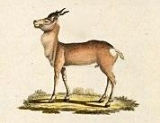
Procapra
Encyclopedia
Procapra refers to a genus of Asian gazelles. It includes three living species:
The oldest fossils belonging to the genus Procapra date from the late Pliocene
or early Pleistocene
of central Asia, which was wetter and warmer then that it is now. The genus apparently evolved from animals similar to the Pliocene gazelle Gazella sinensis, and is known to have been hunted by early Neolithic
humans at Lake Qinghai in China.
- Mongolian Gazelle Procapra gutturosa
- Tibetan Gazelle Procapra picticaudata
- Przewalski's GazellePrzewalski's GazellePrzewalski's Gazelle is a member of the Bovidae family and, in the wild, is found only in China. Once widespread, its range has declined to six populations near Qinghai Lake. The Przewalski's Gazelle was named after Nikolai Przhevalsky, a Russian explorer who collected a specimen and brought it...
Procapra przewalskii
The oldest fossils belonging to the genus Procapra date from the late Pliocene
Pliocene
The Pliocene Epoch is the period in the geologic timescale that extends from 5.332 million to 2.588 million years before present. It is the second and youngest epoch of the Neogene Period in the Cenozoic Era. The Pliocene follows the Miocene Epoch and is followed by the Pleistocene Epoch...
or early Pleistocene
Pleistocene
The Pleistocene is the epoch from 2,588,000 to 11,700 years BP that spans the world's recent period of repeated glaciations. The name pleistocene is derived from the Greek and ....
of central Asia, which was wetter and warmer then that it is now. The genus apparently evolved from animals similar to the Pliocene gazelle Gazella sinensis, and is known to have been hunted by early Neolithic
Neolithic
The Neolithic Age, Era, or Period, or New Stone Age, was a period in the development of human technology, beginning about 9500 BC in some parts of the Middle East, and later in other parts of the world. It is traditionally considered as the last part of the Stone Age...
humans at Lake Qinghai in China.

